Sea buckthorn, scientifically known as Hippophae rhamnoides, is a small orange berry native to Europe and Asia. Renowned for its nutritional value and medicinal properties, sea buckthorn has garnered attention in recent years for its potential health benefits. This article explores the scientific evidence behind the consumption of sea buckthorn and its positive effects on human health.
 Powerful Antioxidant Properties
Powerful Antioxidant Properties
One of the key benefits of sea buckthorn consumption is its potent antioxidant activity. Antioxidants help protect the body against oxidative stress and inflammation, which are implicated in various chronic diseases, including heart disease, cancer, and neurodegenerative disorders. Sea buckthorn berries contain a diverse range of antioxidants, including flavonoids, phenolic acids, and vitamin C, which work synergistically to neutralize free radicals and reduce oxidative damage.
One distinctive feature is the presence of carotenoids, such as beta-carotene and lycopene, which give sea buckthorn its characteristic orange hue. Carotenoids are renowned for their ability to scavenge free radicals and protect cells from oxidative damage, particularly in lipid-rich tissues like the skin and eyes.
Furthermore, sea buckthorn contains high levels of tocopherols, including alpha, beta, gamma, and delta-tocopherol, collectively known as vitamin E. Vitamin E acts as a lipid-soluble antioxidant, meaning it can penetrate cell membranes and protect fatty acids from oxidation. This unique property makes sea buckthorn oil an excellent natural remedy for skin conditions like eczema and dermatitis, as it helps moisturize and nourish the skin while shielding it from environmental stressors.
In addition to its rich antioxidant content, sea buckthorn boasts a balanced ratio of omega-3 to omega-6 fatty acids, which contributes to its anti-inflammatory effects. Omega-3 fatty acids, such as alpha-linolenic acid (ALA), help reduce inflammation and support cardiovascular health by inhibiting the production of pro-inflammatory molecules. Meanwhile, omega-6 fatty acids, such as linoleic acid (LA), play a crucial role in maintaining the integrity of cell membranes and regulating immune function.
 Heart Health
Heart Health
Several studies have suggested that sea buckthorn may have positive effects on heart health. Research indicates that sea buckthorn extracts may help lower blood pressure and improve lipid profiles by reducing levels of total cholesterol, LDL cholesterol, and triglycerides while increasing HDL cholesterol levels. These effects are attributed to the berry’s high content of flavonoids, omega-3 fatty acids, and other bioactive compounds that support cardiovascular function.
Moreover, sea buckthorn stands out among other plants due to its unique combination of bioactive compounds that contribute to its heart-healthy properties. One such compound is omega-7 fatty acids, which are rare in the plant kingdom but abundant in sea buckthorn berries. Omega-7 fatty acids, particularly palmitoleic acid, have been shown to have beneficial effects on heart health by reducing inflammation, improving insulin sensitivity, and promoting lipid metabolism.
In addition to omega-7 fatty acids, sea buckthorn is rich in antioxidants such as vitamin C, vitamin E, and flavonoids. These antioxidants help protect the cardiovascular system by scavenging free radicals, reducing oxidative stress, and preventing the oxidation of LDL cholesterol, which is a key factor in the development of atherosclerosis and coronary artery disease.
Furthermore, sea buckthorn contains a unique group of bioactive compounds known as phytosterols, which are plant-derived compounds that resemble cholesterol structurally. Phytosterols have been shown to lower LDL cholesterol levels by inhibiting its absorption in the intestines, thereby reducing the risk of plaque buildup in the arteries and improving overall heart health.
 Gastrointestinal Health
Gastrointestinal Health
Sea buckthorn has been traditionally used to promote gastrointestinal health and treat various digestive disorders. Studies have shown that sea buckthorn extracts may help alleviate symptoms of conditions such as gastritis, peptic ulcers, and irritable bowel syndrome (IBS). The berry’s anti-inflammatory and mucoprotective properties contribute to its ability to soothe and protect the gastrointestinal tract, enhancing digestive health.
Sea buckthorn stands out among traditional remedies for gastrointestinal health due to its rich composition of bioactive compounds. The berry contains a potent combination of flavonoids, including quercetin, isorhamnetin, and kaempferol, which exhibit strong anti-inflammatory effects. These flavonoids help reduce inflammation in the gastrointestinal tract, alleviating symptoms associated with conditions such as gastritis and peptic ulcers.
Moreover, sea buckthorn is renowned for its mucoprotective properties, thanks to its high content of mucilage and polysaccharides. These compounds form a protective barrier along the gastrointestinal lining, shielding it from harmful substances and irritants. By enhancing mucosal integrity and promoting mucin production, sea buckthorn helps prevent damage to the stomach and intestines, supporting the healing process in individuals suffering from gastrointestinal disorders.
Another remarkable aspect of sea buckthorn’s gastrointestinal benefits lies in its ability to modulate gut microbiota. Recent research has revealed that sea buckthorn extracts possess prebiotic properties, promoting the growth of beneficial bacteria in the gut microbiome while inhibiting the proliferation of pathogenic microbes. This prebiotic effect not only helps maintain a healthy balance of gut flora but also enhances nutrient absorption and immune function, contributing to overall gastrointestinal wellness.
 Skin Care
Skin Care
Sea buckthorn oil is widely used in skincare products due to its hydrating, anti-inflammatory, and regenerative properties. The oil is rich in vitamin E, carotenoids, and omega fatty acids, which nourish the skin, improve elasticity, and promote wound healing. Research suggests that sea buckthorn oil may help alleviate symptoms of conditions like eczema, psoriasis, and acne, making it a valuable ingredient in topical treatments.
Sea buckthorn oil is renowned for its high concentration of rare omega-7 fatty acids, such as palmitoleic acid, which are not commonly found in other plant oils. These omega-7 fatty acids play a crucial role in maintaining skin moisture and integrity, helping to restore the skin’s natural lipid barrier and prevent moisture loss.
Another remarkable feature of sea buckthorn oil is its ability to promote collagen synthesis and skin regeneration. The presence of vitamin E and carotenoids in sea buckthorn oil stimulates collagen production, enhancing skin elasticity and firmness. Additionally, the oil’s regenerative properties accelerate wound healing and tissue repair, making it an effective treatment for scars, burns, and other skin injuries.
Moreover, sea buckthorn oil exhibits balancing and harmonizing effects on the skin’s sebum production, making it suitable for all skin types, including oily, combination, and sensitive skin. Unlike some conventional skincare ingredients that may strip the skin of its natural oils or cause irritation, sea buckthorn oil nourishes and soothes the skin without clogging pores or exacerbating existing skin conditions.
 Immune Support
Immune Support
Sea buckthorn is renowned for its immune-boosting properties, primarily due to its high vitamin C content. Vitamin C plays a crucial role in supporting the immune system by enhancing the production of white blood cells, which are responsible for fighting off infections and pathogens. Regular consumption of sea buckthorn may help strengthen the body’s natural defense mechanisms and reduce the risk of respiratory infections, such as colds and flu.
In addition to its high vitamin C content, sea buckthorn is rich in antioxidants, including flavonoids, phenolic compounds, and carotenoids. These antioxidants work synergistically to neutralize harmful free radicals and reduce oxidative stress in the body, thereby supporting immune function.
Moreover, sea buckthorn contains a spectrum of essential fatty acids, such as omega-3, omega-6, and omega-9 fatty acids, which contribute to its immune-modulating effects. These fatty acids play vital roles in regulating immune responses, inflammation, and the production of immune signaling molecules. By maintaining a balanced immune system, sea buckthorn helps the body mount effective defense mechanisms against pathogens while preventing excessive inflammation and immune dysregulation.
Furthermore, sea buckthorn is notable for its anti-inflammatory properties, which are crucial for immune health. Chronic inflammation can weaken the immune system and increase susceptibility to infections and diseases. Sea buckthorn’s anti-inflammatory compounds help alleviate inflammation in the body, supporting optimal immune function and reducing the risk of inflammatory-related conditions.
 Anti-Inflammatory Effects
Anti-Inflammatory Effects
Inflammation is a natural immune response, but chronic inflammation can contribute to the development of various diseases, including arthritis, diabetes, and cardiovascular disease. Sea buckthorn contains bioactive compounds, such as flavonoids and carotenoids, that possess anti-inflammatory properties. These compounds help reduce inflammation in the body by inhibiting the production of pro-inflammatory cytokines and enzymes, thereby mitigating the risk of chronic inflammatory conditions.
One such compound found abundantly in sea buckthorn is quercetin, a flavonoid renowned for its potent anti-inflammatory effects. Quercetin acts as a natural inhibitor of inflammatory pathways, targeting key enzymes and signaling molecules involved in the inflammatory response. By modulating the activity of these pathways, sea buckthorn helps to dampen chronic inflammation and alleviate associated symptoms.
Moreover, sea buckthorn is uniquely endowed with a balanced ratio of omega-3 to omega-6 fatty acids, a characteristic that contributes to its anti-inflammatory prowess. Unlike many modern diets, which tend to be disproportionately high in omega-6 fatty acids, sea buckthorn offers a more favorable balance, promoting a healthier inflammatory response in the body. The presence of omega-3 fatty acids, particularly alpha-linolenic acid (ALA), further enhances sea buckthorn’s anti-inflammatory profile, exerting protective effects on cardiovascular health and immune function.
In addition to quercetin and fatty acids, sea buckthorn contains high levels of betaine, a naturally occurring compound with anti-inflammatory and antioxidant properties. Betaine acts as a methyl donor, participating in key biochemical reactions that regulate inflammation and oxidative stress. By modulating gene expression and cellular signaling, betaine helps to suppress the production of pro-inflammatory molecules while promoting the synthesis of protective antioxidants, thereby creating a harmonious balance within the body’s inflammatory response.
Eye Health
The high concentration of vitamins A and E in sea buckthorn makes it beneficial for maintaining eye health. Vitamin A is essential for vision as it supports the function of the retina and helps prevent age-related macular degeneration (AMD) and night blindness. Meanwhile, vitamin E acts as an antioxidant, protecting the eyes from oxidative damage caused by exposure to ultraviolet (UV) radiation and environmental pollutants. Regular consumption of sea buckthorn may help preserve vision and reduce the risk of eye disorders.
In addition to its rich content of vitamins A and E, sea buckthorn boasts a unique combination of bioactive compounds that further enhance its efficacy in promoting eye health. Carotenoids, such as beta-carotene, lutein, and zeaxanthin, are abundant in sea buckthorn berries and play a crucial role in maintaining visual function and protecting the eyes from oxidative stress.
Beta-carotene, a precursor to vitamin A, is converted into retinol in the body, supporting the synthesis of visual pigments in the retina and optimizing light perception. Lutein and zeaxanthin, on the other hand, accumulate in the macula of the eye, where they act as natural filters, absorbing harmful blue light and shielding the retina from photodamage.
Furthermore, sea buckthorn contains a spectrum of flavonoids, phenolic compounds, and omega-3 fatty acids, which exert synergistic effects on eye health. Flavonoids, such as quercetin and rutin, possess anti-inflammatory and antioxidant properties, reducing inflammation and protecting ocular tissues from damage. Omega-3 fatty acids, particularly docosahexaenoic acid (DHA) and eicosapentaenoic acid (EPA), contribute to the structural integrity of cell membranes in the retina, promoting optimal visual function and retinal health.
Liver Health
Sea buckthorn has been studied for its potential hepatoprotective effects, meaning it may help protect the liver from damage and support its function. Research suggests that sea buckthorn extracts exhibit antioxidant and anti-inflammatory properties that can help reduce liver inflammation and oxidative stress, thereby promoting liver health. Regular consumption of sea buckthorn may benefit individuals with liver conditions such as fatty liver disease, hepatitis, and liver cirrhosis.
Furthermore, sea buckthorn is a rich source of phenolic acids, including gallic acid and ellagic acid, which possess anti-inflammatory and anti-fibrotic properties. These compounds help suppress inflammation and fibrosis in the liver, reducing the risk of progression to more severe liver conditions such as cirrhosis.
Omega fatty acids, particularly omega-3 and omega-7 fatty acids, are abundant in sea buckthorn oil and have been implicated in liver health. Omega-3 fatty acids, such as alpha-linolenic acid (ALA), exert anti-inflammatory effects and may help mitigate liver inflammation associated with various liver diseases. Omega-7 fatty acids, such as palmitoleic acid, have been shown to improve lipid metabolism and reduce liver fat accumulation, making them beneficial for individuals with fatty liver disease.
In addition to its antioxidant, anti-inflammatory, and lipid-modulating properties, sea buckthorn contains vitamins and minerals that support overall liver function. Vitamin E, in particular, acts as a potent antioxidant, protecting liver cells from oxidative damage and preserving their integrity. Vitamin C enhances the immune response and promotes collagen synthesis, aiding in liver tissue repair and regeneration.
Cognitive Function
The antioxidant compounds found in sea buckthorn, such as flavonoids and vitamin E, may also have positive effects on cognitive function and brain health. These compounds help protect brain cells from oxidative damage and inflammation, which are implicated in neurodegenerative diseases like Alzheimer’s and Parkinson’s disease. While more research is needed, preliminary studies suggest that sea buckthorn may support cognitive function and reduce the risk of age-related cognitive decline.
One distinguishing feature is its rich content of omega-7 fatty acids, a relatively rare fatty acid that has shown promising effects on brain function. Omega-7 fatty acids, also known as palmitoleic acid, play a role in supporting neuronal signaling and synaptic plasticity, essential processes for learning and memory.
Furthermore, sea buckthorn contains a unique profile of carotenoids, including beta-carotene, lutein, and zeaxanthin, which have been linked to cognitive enhancement and neuroprotection. These carotenoids not only provide antioxidant defense against oxidative stress but also exert anti-inflammatory effects within the brain, helping to mitigate neuroinflammation, a common feature of neurodegenerative diseases.
Moreover, the synergistic interactions between the various bioactive compounds present in sea buckthorn contribute to its cognitive-enhancing properties. Studies suggest that the combination of antioxidants, fatty acids, vitamins, and minerals found in sea buckthorn may exert additive or synergistic effects on brain health, enhancing neuroprotection and cognitive function beyond what individual components could achieve alone.
Anti-Cancer Properties
Some studies have investigated the potential anti-cancer properties of sea buckthorn. Research suggests that the bioactive compounds found in sea buckthorn, including flavonoids, carotenoids, and fatty acids, may possess anti-cancer effects by inhibiting the growth and proliferation of cancer cells, inducing apoptosis (cell death), and preventing angiogenesis (the formation of new blood vessels that support tumor growth). While further research is needed to fully understand the anti-cancer potential of sea buckthorn, preliminary findings are promising.
Notably, sea buckthorn contains high levels of omega-7 fatty acids, specifically palmitoleic acid, which has shown promising anti-cancer effects in preclinical studies. Palmitoleic acid has been found to inhibit the proliferation of cancer cells and induce apoptosis through various molecular pathways, making it a potent ally in cancer prevention and treatment.
Additionally, sea buckthorn contains a rare group of bioactive compounds called betulinic acid and betulin, which have shown promising anti-cancer activity by targeting specific signaling pathways involved in tumor growth and metastasis.
Sports Performance and Recovery
Athletes and fitness enthusiasts may benefit from incorporating sea buckthorn into their diet to support sports performance and recovery. Sea buckthorn is rich in vitamins, minerals, and antioxidants that can help replenish energy stores, reduce muscle soreness and inflammation, and support tissue repair and recovery following intense physical activity. Additionally, the anti-inflammatory properties of sea buckthorn may help mitigate exercise-induced inflammation and oxidative stress, promoting faster recovery and improved athletic performance.
Hair and Nail Health
Sea buckthorn oil is often used in cosmetic products for its potential benefits for hair and nail health. The oil’s high concentration of vitamins E and C, along with omega fatty acids, nourishes the scalp, strengthens hair follicles, and promotes healthy hair growth. Similarly, sea buckthorn oil can improve the strength and appearance of nails, reducing brittleness and promoting nail growth. Regular use of sea buckthorn oil in hair and nail care products may help maintain their health and vitality.
Nutritional Value of Sea Buckthorn (per 100 grams)
- Calories: Approximately 88 kcal
- Protein: Around 1.2 grams
- Fat: Roughly 4.5 grams
- Saturated Fat: Less than 1 gram
- Monounsaturated Fat: Around 3 grams
- Polyunsaturated Fat: Approximately 1 gram
- Carbohydrates: About 11 grams
- Dietary Fiber: Approximately 7 grams
- Sugars: Around 4 grams
- Vitamins:
- Vitamin C: Up to 695 milligrams (1158% of the Daily Value)
- Vitamin A: Around 70 micrograms (8% of the Daily Value)
- Vitamin E: Approximately 10 milligrams (50% of the Daily Value)
- Vitamin K: About 1 microgram (1% of the Daily Value)
- B Vitamins (B1, B2, B6): Trace amounts
- Minerals:
- Potassium: Approximately 212 milligrams (6% of the Daily Value)
- Calcium: Around 68 milligrams (7% of the Daily Value)
- Magnesium: Approximately 33 milligrams (8% of the Daily Value)
- Iron: About 1.4 milligrams (8% of the Daily Value)
- Phosphorus: Approximately 49 milligrams (5% of the Daily Value)
- Other Nutrients:
- Omega-3 Fatty Acids: Around 75 milligrams
- Omega-6 Fatty Acids: Approximately 950 milligrams
Note: The nutritional values provided are approximate and can vary based on factors such as variety, ripeness, and processing methods. It’s essential to refer to specific product labels or consult with a nutritionist for precise nutritional information.
Conclusion
In conclusion, sea buckthorn is a nutritional powerhouse with numerous health benefits supported by scientific research. From its antioxidant properties to its positive effects on heart health, gastrointestinal function, and skin care, sea buckthorn offers a range of potential therapeutic applications. Whether consumed as a juice, supplement, or topical oil, incorporating sea buckthorn into your diet and skincare routine may contribute to overall health and well-being.
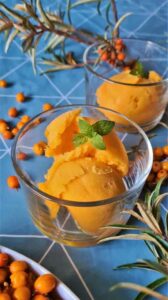 Are you ready to tantalize your taste buds with a burst of tangy sweetness? Look no further than our tantalizing Sea Buckthorn Sorbet recipe. Crafted with the vibrant hues and zesty flavors of sea buckthorn berries, this sorbet offers a refreshing twist on traditional frozen treats. Whether you’re seeking a light and palate-cleansing dessert or simply craving a vibrant burst of flavor, this sorbet is sure to delight. Join us as we explore the simple yet exquisite journey of creating this delicious frozen delight.
Are you ready to tantalize your taste buds with a burst of tangy sweetness? Look no further than our tantalizing Sea Buckthorn Sorbet recipe. Crafted with the vibrant hues and zesty flavors of sea buckthorn berries, this sorbet offers a refreshing twist on traditional frozen treats. Whether you’re seeking a light and palate-cleansing dessert or simply craving a vibrant burst of flavor, this sorbet is sure to delight. Join us as we explore the simple yet exquisite journey of creating this delicious frozen delight.
Contraindications to Sea Buckthorn Consumption
Allergies: Individuals with known allergies to plants in the Elaeagnaceae family, including sea buckthorn, should avoid consuming sea buckthorn products as they may experience allergic reactions such as itching, swelling, or difficulty breathing.
Blood Pressure Medication: Sea buckthorn supplements or extracts may interact with certain blood pressure medications, potentially leading to fluctuations in blood pressure levels. Individuals taking antihypertensive drugs should consult with their healthcare provider before incorporating sea buckthorn into their diet.
Blood Clotting Disorders: Sea buckthorn contains vitamin K, which plays a role in blood clotting. Therefore, individuals with blood clotting disorders or those taking blood-thinning medications, such as warfarin, should exercise caution when consuming sea buckthorn as it may interfere with medication efficacy.
Gastrointestinal Conditions: Some individuals may experience gastrointestinal discomfort, such as nausea, diarrhea, or abdominal cramps, after consuming sea buckthorn products. Those with pre-existing gastrointestinal conditions, such as gastritis, peptic ulcers, or irritable bowel syndrome (IBS), should consume sea buckthorn with caution and monitor their symptoms.
Pregnancy and Breastfeeding: While sea buckthorn is generally considered safe for most individuals when consumed in moderate amounts, pregnant and breastfeeding women should consult with their healthcare provider before incorporating sea buckthorn into their diet to ensure safety for both mother and baby.
Surgery: Sea buckthorn may affect blood clotting and blood pressure, so individuals scheduled for surgery should inform their healthcare provider about any sea buckthorn supplements or products they have consumed to prevent potential complications during the perioperative period.
Diabetes: Sea buckthorn supplements or extracts may lower blood sugar levels, so individuals with diabetes or those taking medications to manage blood sugar should monitor their blood glucose levels closely when consuming sea buckthorn to prevent hypoglycemia.
It’s essential to consult with a healthcare professional before adding sea buckthorn products to your diet, especially if you have any underlying medical conditions or are taking medications that may interact with sea buckthorn. Additionally, moderation is key, and it’s advisable to consume sea buckthorn in recommended amounts to avoid adverse effects.
Fascinating Facts About Sea Buckthorn
- Ancient Healing Elixir:
Sea buckthorn’s medicinal use dates back centuries, with historical records documenting its presence in traditional Chinese, Tibetan, and Ayurvedic medicine. Ancient healers prized sea buckthorn for its ability to treat various ailments, including digestive disorders, skin conditions, and even respiratory infections.
- Hardy Survivor:
Sea buckthorn is a resilient plant that thrives in harsh environmental conditions, including sandy soils, rocky terrain, and extreme temperatures. Its adaptability allows it to flourish in regions where few other plants can survive, such as high altitudes, arid deserts, and cold climates.
- Soil Stabilizer:
The deep-reaching roots of the sea buckthorn plant play a vital role in soil stabilization and erosion control. In regions prone to soil erosion, such as mountain slopes and coastal areas, sea buckthorn’s extensive root system helps bind the soil together, preventing erosion and land degradation.
- Ecological Champion:
Sea buckthorn is considered an ecological pioneer species, meaning it plays a crucial role in ecosystem restoration and regeneration. Its ability to colonize barren landscapes and improve soil fertility makes it a valuable ally in reforestation efforts and ecological rehabilitation projects.
- Astronaut’s Companion:
In an unexpected twist, sea buckthorn has ventured beyond Earth’s atmosphere. Due to its high nutritional value and resilience, it has been included in the diet of astronauts during space missions to provide essential nutrients and boost immune function in the challenging conditions of space travel.
- Traditional Dye:
In addition to its medicinal and culinary uses, sea buckthorn has served as a natural dye for centuries. The vibrant pigments extracted from its berries were traditionally used to dye fabrics, yarns, and even Easter eggs, imparting a rich golden-orange hue to textiles and decorations.
- Folklore and Legend:
Sea buckthorn has woven itself into the fabric of folklore and mythology across cultures. In Tibetan tradition, it is known as “gold of the Himalayas” and is revered for its mythical origins and healing properties. Legends tell of mystical lands where sea buckthorn thrives, offering nourishment and vitality to those who seek it.
- Environmental Warrior:
Sea buckthorn’s dense foliage and thorny branches serve as a natural barrier, providing habitat and protection for wildlife. Birds, insects, and small mammals seek refuge in its branches, while its berries offer a vital food source during the lean winter months, supporting biodiversity and ecological balance.
- Mystical Healing Waters:
Legends abound of sacred springs and healing waters infused with the essence of sea buckthorn. These mystical waters were said to possess miraculous powers, granting health, vitality, and rejuvenation to those who bathed in or drank from them, reinforcing sea buckthorn’s reputation as a symbol of wellness and renewal.
- Bird Magnet:
Sea buckthorn is not only cherished by humans but also beloved by birds. The berries’ bright color and nutrient-rich flesh make them a favorite food source for various bird species, including thrushes, warblers, and waxwings. In some regions, sea buckthorn stands are known as bird havens, attracting flocks of avian visitors during the berry-bearing season.
- Solar-Powered Berry:
Sea buckthorn berries possess a unique ability to harness the sun’s energy through photosynthesis, even in harsh and challenging environments. Their high concentration of chlorophyll allows them to convert sunlight into energy, contributing to their vibrant color and nutritional density.
- Fertility Symbol:
Across cultures, sea buckthorn has been associated with fertility and abundance. Its vigorous growth and prolific berry production symbolize fertility and renewal, making it a popular motif in fertility rituals, wedding ceremonies, and celebrations of new beginnings.
- Traditional Toothpaste:
In some cultures, sea buckthorn leaves and twigs were used as a natural toothpaste and oral hygiene aid. The astringent properties of sea buckthorn were believed to cleanse and strengthen teeth, while its antimicrobial effects helped combat oral bacteria and promote gum health.
- Biofuel Potential:
Researchers are exploring sea buckthorn’s potential as a sustainable biofuel source due to its high oil content and rapid growth rate. Extracting oil from sea buckthorn seeds could yield biodiesel, offering a renewable and eco-friendly alternative to fossil fuels.
To explore more plants, please visit our page about plants
References
Yang, B., & Kallio, H. (2002). Composition and physiological effects of sea buckthorn (Hippophaë) lipids. Trends in Food Science & Technology, 13(5), 160-167.
Gupta, A., Kumar, R., & Pal, K. (2011). Hippophae rhamnoides: A potential source of nutraceuticals. Food Science and Technology International, 17(3), 173-184.
Zeb, A. (2006). Chemical and nutritional constituents of sea buckthorn juice. Pakistan Journal of Nutrition, 5(2), 116-119.
Upadhyay, N. K., Kumar, R., & Siddiqui, M. S. (2014). Antioxidant, cytoprotective and antibacterial effects of Sea buckthorn (Hippophae rhamnoides L.) leaves. Food and Chemical Toxicology, 62, 658-664.
Zheng, S., Li, Y., & Jiang, D. (2017). Sea buckthorn polysaccharide inhibits the development of dextran sulfate sodium induced colitis via targeting TLR4/NF‐κB pathway. Life Sciences, 180, 1-7.
Jiao, Y., Huang, B., Chen, W., Deng, J., Xu, M., & Wang, Y. (2017). Anti-inflammatory effects of total flavones of Hippophae rhamnoides L. on trinitrobenzene sulfonic acid-induced ulcerative colitis in rats. Journal of Ethnopharmacology, 206, 267-276.
Gupta, A., Kumar, R., & Pal, K. (2011). Sea buckthorn (Hippophae rhamnoides L.) leaf extract ameliorates the gamma radiation mediated DNA damage and hepatic alterations. Journal of Environmental Pathology, Toxicology and Oncology, 30(4), 315-331.
Wang, Z., Gerstein, M., & Snyder, M. (2009). RNA-Seq: a revolutionary tool for transcriptomics. Nature Reviews Genetics, 10(1), 57-63.
Geetha, S., Ram, M. S., & Singh, V. (2012). Evaluation of antioxidant and hepatoprotective activities of sea buckthorn (Hippophae rhamnoides L.) leaves. Food and Chemical Toxicology, 50(12), 4333-4337.
Zeb, A. (2007). Chemical and nutritional constituents of sea buckthorn juice. Pakistan Journal of Nutrition, 6(2), 112-113.
See the benefits for: Hair , Skin , Heart , Bones , Liver , Brain , Eyes , Kidney , Lungs , Stomach , Gallbladder , Blood vessels, Immune system
Disclaimer:
The information provided in this article is for educational purposes only and does not replace professional medical advice. Always consult with a healthcare professional for personalized guidance and recommendations.

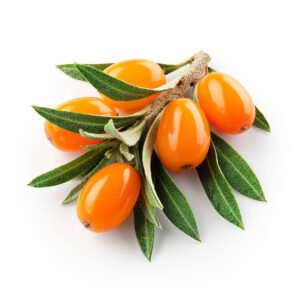 Powerful Antioxidant Properties
Powerful Antioxidant Properties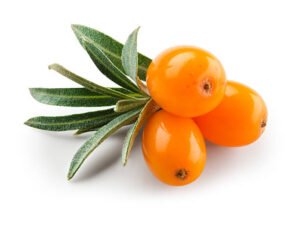 Heart Health
Heart Health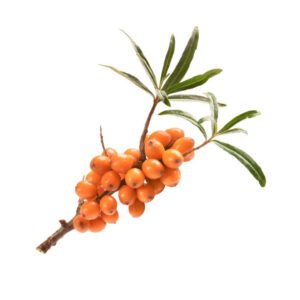 Gastrointestinal Health
Gastrointestinal Health Skin Care
Skin Care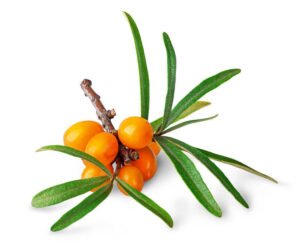 Immune Support
Immune Support Anti-Inflammatory Effects
Anti-Inflammatory Effects